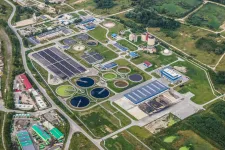Richness of plant species reduces the number of viral infections in meadows
Richness of plant species reduces the number of viral infections in both wild meadows and meadows on the edges of cultivated fields
2021-02-08
(Press-News.org) A study carried out at the University of Helsinki indicates that agricultural activity confuses the mechanisms that regulate the occurrence of plant diseases in nature. A wider variety of virus species was found in meadows close to agricultural fields compared to those located in natural surroundings, with the richness of plant species having no effect on the number of virus species. However, maintaining biodiversity is worthwhile, as plant richness did reduce the number of viral infections in the meadows.
An increasing share of the global land area is used for agricultural purposes, with more and more of the remaining area located at the boundary between agricultural and natural land, also known as the agro-ecological interface. At the same time, biodiversity is narrowing and epidemics are threatening humans, animals and plants. In the wild, species interact with one another, making the richness and distribution of host species in a given area impact the occurrence of pathogens as well.
The Research Centre for Ecological Change headed by Professor Anna-Liisa Laine at the University of Helsinki surveyed the effects of the proximity of cultivated land to viral distribution in ribwort plantain (Plantago lanceolata) meadows in the Åland Islands.
"The meadow network on the Åland Islands is favourable for research, as we have previously identified five new plant viruses in the area. It was the distribution of these viruses we were now able to investigate, thanks to the techniques we have developed for the purpose. We chose for our study meadows located either on the edges of fields or far away from agricultural land," says researcher Hanna Susi from the University of Helsinki's Faculty of Biological and Environmental Sciences, who headed the study.
At the agro-ecological interface, many factors that affect the spread of plant diseases, including soil nutrients as well as the diversity and density of plant species, change suddenly. The researchers observed that the effect of agriculture extends, however, to the areas surrounding fields.
"Surprisingly enough, we observed no differences in species richness or community composition between plant communities situated on field edges and wild populations further away," Susi notes.
The researchers found that the meadows on the edges of fields had a higher number of virus species whose numbers were not reduced by plant richness, contrary to what was seen in meadows surrounded by natural environments. At the same time, the richness of plants reduced viral infections in both meadow types.
The study conducted by Laine's group indicates that agricultural activity confuses the mechanisms that regulate the occurrence of diseases in the wild.
"However, maintaining biodiversity is worthwhile, as the richness of plant species did reduce the number of viral infections in the meadows - regardless of location," Susi says.
INFORMATION:
[Attachments] See images for this press release:

ELSE PRESS RELEASES FROM THIS DATE:
2021-02-08
As part of a worldwide collaboration, Carnegie Mellon University chemists have helped discover that iodic acids can rapidly form aerosol particles in the atmosphere, giving scientists more knowledge of how iodine emissions can contribute to cloud formation and climate change.
"Essentially all uncertainty around climate change and the atmosphere has something to do with particles and cloud droplets," said Neil Donahue, Thomas Lord University Professor of Chemistry and a professor in the departments of Chemical Engineering, and Engineering and Public Policy. The Donahue ...
2021-02-08
Face masks mandates have led people to spend less time at home, but whether this has exposed Americans to more risk is still a question, according to a new study published Thursday in Scientific Reports.
Using anonymized location data from smart devices, the study, conducted by Yale School of the Environment Professor Eli Fenichel, Youpei Yan, YSE postdoctoral associate, Colorado State University Assistant Professor Jude Bayham and Aaron Richter, a Yale research affiliate, examined changes in behavior of residents two weeks before and two weeks after mask mandates were implemented in regions of the United States.
The study found that residents spent between 11-24 more minutes outside their homes after a facemask mandate was issued, even as COVID-19 rates were rising in the U.S. ...
2021-02-08
A new study of autism risk genes by UC San Francisco and UC Berkeley scientists implicates disruption in prenatal neurogenesis - a process in which specialized "progenitor" cells give rise to new brain cells - in the development of autism spectrum disorders (ASDs). The study also shows that estrogen, perhaps in a form produced within brain cells, can protect against this disruption and steer the brain on a normal course of development.
The most striking findings in the study, published on January 25, 2021 in Neuron, were derived from experiments using embryos of the western clawed frog (Xenopus tropicalis), a species prized by biologists for the unique insights it offers into development. Human genes involved in development ...
2021-02-08
Prompted by the need to improve conventional treatments for people infected with the human immunodeficiency virus (HIV-1), a team from the Institut national de la recherche scientifique (INRS) has identified a therapeutic approach to restore the effectiveness of immune cells. The study, led by doctoral student Hamza Loucif and Professor Julien van Grevenynghe, was published in the journal Autophagy.
Most people infected with HIV-1 require daily antiretroviral therapy to control the infection. These drugs cause significant side effects without fully restoring the normal functioning of the immune system. ...
2021-02-08
SPOKANE, Wash. - Diabetic patients taking the natural product goldenseal while taking the prescription drug metformin may be unwittingly sabotaging their efforts to maintain healthy blood glucose levels. This concern arose from a recent study published in the journal Clinical Pharmacology & Therapeutics.
Metformin--the world's most-prescribed oral glucose-lowering medication--was included in a cocktail of selected drugs given to participants in a clinical study led by scientists at Washington State University's College of Pharmacy and Pharmaceutical Sciences. The study sought to determine the impact of goldenseal on specific ...
2021-02-08
A new study by scientists at Utrecht University and the United Nations University concludes that about half of global wastewater is treated, rather than the previous estimate of 20%. Despite this promising finding, the authors warn that treatment rates in developing countries are still very low. The study and its dataset were published Open Access in the journal Earth System Science Data.
Humans and factories produce vast quantities of wastewater per day. If not properly collected and treated, wastewater may severely threaten human health and pollute the environment.
144 million swimming pools
The authors use national statistics to estimate volumes of wastewater production, collection, treatment and reuse. "Globally, about 359 ...
2021-02-08
Faster speech rate, greater intensity in the middle of the word, and falling pitch at the end of the word: that is the prosody[1] to adopt if one wants to come across as reliable and honest to one's listeners. Scientists from the Science and Technology for Music and Sound laboratory (CNRS/Ircam/Sorbonne Université/Ministère de la Culture)[2] and the Perceptual Systems Laboratory (CNRS/ENS PSL) have conducted a series of experiments[3] to understand how we decide, based on the voice, whether a speaker is honest and confident, or on the contrary dishonest and uncertain. They have also shown that this signature was perceived similarly ...
2021-02-08
The sense of hearing is, quite literally, a molecular tightrope act. Turns out, it involves acrobatics as well.
In a paper published in Nature Communications on Feb 8, researchers at Harvard Medical School and Boston Children's Hospital show that a dynamic and delicate connection between two pairs of diminutive protein filaments plays a central role in in hearing.
The tension held by these filaments, together called a tip link, is essential for the activation of sensory cells in the inner ear. The team's analyses reveal that the filaments, which are joined end-to-end, work together like trapeze artists holding ...
2021-02-08
COVID-19 has not only caused a temporary drop in global CO2 emissions, it has also reduced the share of power generated by burning coal - a trend that could in fact outlast the pandemic. This is the key result of a new study by a team of economists based in Potsdam and Berlin that looked at COVID-19's impact on the energy system and demand for electricity. Their findings show that the pandemic, while putting a terrible toll on people's lives and the economy, has also opened a window of opportunity to make this current trend of decreasing coal use irreversible: Supported by the right climate policy measures, power sector emissions could decline more rapidly than previously thought.
"Coal has been hit harder by the Corona crisis than other power sources - and the reason is ...
2021-02-08
Higher blood pressure at night than in daytime may be a risk factor for Alzheimer's disease in older men. This is suggested by a new study from researchers at Uppsala University, now published in the journal Hypertension.
'Dementia' is an umbrella term used to describe a category of symptoms marked by behavioural changes and gradually declining cognitive and social abilities. Numerous factors, including hypertension (high blood pressure), affect the risk of developing these symptoms.
Under healthy conditions, blood pressure (BP) varies over 24 hours, with lowest values reached at night. Doctors call this nocturnal blood pressure fall 'dipping'. However, in some people, ...
LAST 30 PRESS RELEASES:
[Press-News.org] Richness of plant species reduces the number of viral infections in meadows
Richness of plant species reduces the number of viral infections in both wild meadows and meadows on the edges of cultivated fields



